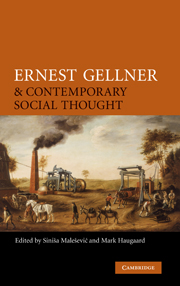Book contents
- Frontmatter
- Contents
- Notes on contributors
- Acknowledgements
- Introduction: an intellectual rebel with a cause
- Part I Civil society, coercion and liberty
- Part II Ideology, nationalism and modernity
- Part III Islam, postmodernism and Gellner's metaphysic
- 8 Islam, modernity and science
- 9 Truth, reason and the spectre of contingency
- 10 Gellner's metaphysic
- Index
- References
8 - Islam, modernity and science
Published online by Cambridge University Press: 22 September 2009
- Frontmatter
- Contents
- Notes on contributors
- Acknowledgements
- Introduction: an intellectual rebel with a cause
- Part I Civil society, coercion and liberty
- Part II Ideology, nationalism and modernity
- Part III Islam, postmodernism and Gellner's metaphysic
- 8 Islam, modernity and science
- 9 Truth, reason and the spectre of contingency
- 10 Gellner's metaphysic
- Index
- References
Summary
Gellner on modernity and Islam
Ernest Gellner's definition of modernity stressed two elements: a mode of cognition (science) and a mode of production (industrialism). He stressed also that industrial-scientific society needs (and has) a uniform and universal literate culture, whereas premodern (‘agro-literate’) societies were divided between a literate ‘high’ culture and one or several illiterate ‘folk’ cultures (Gellner 1990: 16–21, 62–7; 1998: 21). Muslim civilisation, accordingly, was divided between ‘high’ and ‘folk’ Islam, the former being the central, orthodox tradition (Gellner 1992: 9–12). Adapting Christian terminology, Gellner dubbed it (generically) ‘protestant’, in contrast to ‘folk’ Islam. There was significant conflict between the two versions, although, unlike the Christian case, no formal break occurred (Gellner 1981: 4–5).
What did Gellner mean by calling high Islam (generically) protestant? First, it is strongly oriented to holy texts, valuing learning based on these. It is sober and puritanical, averse to ‘hysteria and excess, and to the excessive use of the audio-visual aids of religion’. It is orderly and rule-observing. Above all, it stresses the ‘severely monotheistic … nature of Islam’, discountenancing saintly and other mediators between man and God. It is thus spiritually egalitarian (like Luther's ‘priesthood of all believers’). It is a religion for a literate urban stratum of merchants, scholars and others (Gellner 1992: 11).
Folk Islam, being the religion of illiterate masses, inevitably focuses (focused) much less on texts and textual scholarship.
- Type
- Chapter
- Information
- Ernest Gellner and Contemporary Social Thought , pp. 189 - 226Publisher: Cambridge University PressPrint publication year: 2007



